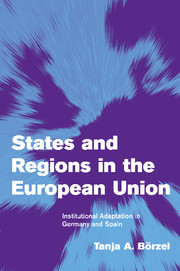Book contents
- Frontmatter
- Contents
- List of figures
- List of tables
- Acknowledgements
- List of abbreviations
- Introduction
- Part I Europeanization and domestic institutional change: A historical institutionalist approach
- Part II Reinforcing cooperative federalism: Institutional adaptation to Europeanization in Germany
- 4 The Federal Republic of Germany as a model of cooperative federalism
- 5 The rinascimento of cooperative federalism: The impact of Europeanization on the territorial institutions of Germany
- 6 Conclusion
- Part III Transforming competitive regionalism: Institutional adaptation to Europeanization in Spain
- Part IV Sharing versus shifting the costs of adaptation: The Europeanization of environmental policy-making in Germany and Spain
- Conclusions: Toward convergence in Europe?
- Appendix: The major EU environmental policies of the policy study
- List of references
- Index
6 - Conclusion
Published online by Cambridge University Press: 22 September 2009
- Frontmatter
- Contents
- List of figures
- List of tables
- Acknowledgements
- List of abbreviations
- Introduction
- Part I Europeanization and domestic institutional change: A historical institutionalist approach
- Part II Reinforcing cooperative federalism: Institutional adaptation to Europeanization in Germany
- 4 The Federal Republic of Germany as a model of cooperative federalism
- 5 The rinascimento of cooperative federalism: The impact of Europeanization on the territorial institutions of Germany
- 6 Conclusion
- Part III Transforming competitive regionalism: Institutional adaptation to Europeanization in Spain
- Part IV Sharing versus shifting the costs of adaptation: The Europeanization of environmental policy-making in Germany and Spain
- Conclusions: Toward convergence in Europe?
- Appendix: The major EU environmental policies of the policy study
- List of references
- Index
Summary
Part II of this book has shown that Europeanization has exerted significant pressure for adaptation on German territorial institutions. European institutions which concentrate decision-making powers in the hands of member-state executives while shifting the implementation costs of European policies to subordinate levels (national, regional, and local) do not match the structure of the formal institutions of German federalism. The latter provide for a sharing of both decision-making powers and implementation costs between central state and regions. As a result of this institutional misfit, Europeanization has caused an uneven distribution of “say and pay” to the detriment of the German Länder. On the one hand, the transfer of policy competencies to the European level has not only given the Bund access to exclusive Länder competencies (which the German Constitution had blocked), but the co-decision powers of the Länder in federal policy-making (formulation, decision, and implementation) have also been reduced to the implementation of European policies. On the other hand, the Länder have had to implement policies in whose formulation and decision-making they did not formally participate, and this precluded a sharing of implementation costs. The uneven distribution of “say and pay” in European policy-making has led to a redistribution of resources between Bund and Länder that has changed the territorial balance of power in favor of the central state.
I have argued that the informal institutions of cooperative federalism have facilitated the adaptation of its formal institutions to this Europe-induced shift of power.
- Type
- Chapter
- Information
- States and Regions in the European UnionInstitutional Adaptation in Germany and Spain, pp. 88 - 90Publisher: Cambridge University PressPrint publication year: 2001

